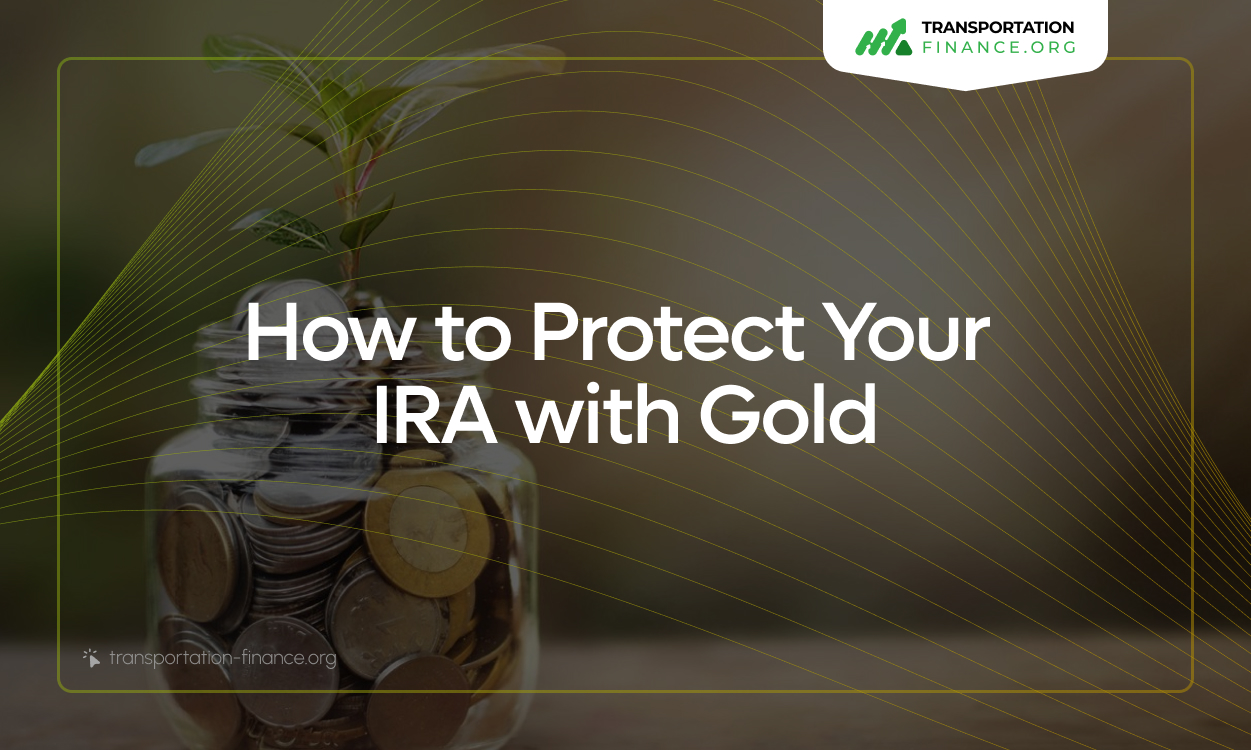Disclaimer: The companies mentioned in this report may offer compensation to us, without any charge to our readers. This is how we keep our reporting free for readers. Our selection of companies is determined by compensation and rigorous analysis.
Looking to safeguard your IRA and protect your retirement savings? One valuable option to consider is investing in gold.
In this comprehensive guide, we will explore the benefits of adding gold to your IRA, the risks your IRA may face, and the different ways you can invest in gold.
Whether you choose physical gold, gold ETFs, gold mining stocks, or gold futures, we will also walk you through the process of setting up a Gold IRA and the tax implications you should be aware of.
Let's dive in and secure your financial future with gold.
Our team has spent years researching every company in the precious metals industry. Save your time and use our research ⟶
Hand picked top 5 trusted and best reviewed companies
Protect Your Retirement
Claim Your FREE Gold Kit Now
Key Takeaways
What Is an IRA?
An Individual Retirement Account (IRA) is a tax-advantaged investment account designed to help individuals save for retirement, allowing their investments to grow tax-free or tax-deferred depending on the type of IRA, such as traditional or Roth, as defined by the IRS regulations.
Traditional IRAs offer tax-deferred growth, meaning contributions are often tax-deductible, reducing taxable income. Withdrawals during retirement are taxed as ordinary income.
Each type has specific eligibility criteria and contribution limits set by the IRS, ensuring compliance and maximum benefit for retirement savings.
Why Should You Protect Your IRA?
Protecting your IRA is crucial to ensure that your retirement savings remain secure and continue to grow, especially during times of economic uncertainty, and a financial advisor can help maximize the diversification benefits to safeguard your investments.
What Are the Risks to Your IRA?
The primary risks to your IRA include market volatility, economic uncertainty, inflation, and potential legal issues, all of which can significantly impact the value of your retirement savings.
Market volatility can lead to sudden and drastic fluctuations in the value of your investments, causing stress and uncertainty about your financial future. Economic uncertainty, such as recessions or geopolitical events, can also pose a risk to your IRA by affecting overall market conditions. Inflation erodes the purchasing power of your retirement savings over time, potentially reducing your standard of living in retirement.
To mitigate these risks, diversification is key. Spread your investments across different asset classes, such as stocks, bonds, and real estate, to reduce the impact of market volatility. Regularly review and adjust your investment portfolio to align with your risk tolerance and financial goals. Consult with a financial advisor who can provide personalized advice and help you navigate these challenges effectively.
How Can Gold Protect Your IRA?
Investing in a gold IRA can protect your retirement savings by including physical gold and other precious metals, which act as a hedge against inflation and economic uncertainties, thus providing stability and growth potential.
What Are the Advantages of Gold in an IRA?
The advantages of including gold in an IRA include diversification benefits, as gold often moves inversely to traditional assets like stocks and bonds, acting as an inflation hedge, and offering unique tax advantages.
Gold, through its inherent physical properties, has historically proven to be a reliable store of value during turbulent economic times, preserving wealth for investors. This is exemplified by gold's performance during market crashes such as the Great Recession of 2008, where it retained its value while other assets plummeted.
Gold's stability can provide a safeguard against geopolitical uncertainties, as seen in times of political unrest or global crises where gold prices tend to surge due to its safe-haven appeal.
What Are the Different Ways to Invest in Gold for Your IRA?
There are several ways to invest in gold for your IRA, including purchasing physical gold, investing in gold ETFs, acquiring shares in gold mining stocks, or trading gold futures.
One popular method is purchasing physical gold, which involves buying gold bars, coins, or bullion. This provides a tangible asset that can act as a hedge against inflation and economic uncertainty. Storing physical gold can be cumbersome and may incur additional costs for security and insurance.
Another option is investing in gold ETFs, which offer the benefits of owning gold without the need for storage. Gold ETFs are traded on stock exchanges and provide liquidity, but they may not fully represent the actual price movement of physical gold.
Acquiring shares in gold mining stocks is a way to gain exposure to the gold market through companies involved in gold exploration and production. While these stocks can offer significant potential returns during gold price upswings, they also carry risks related to individual company performance and operational challenges.
What Are the Different Types of Gold for Your IRA?
When considering a gold IRA, it's essential to understand the different types of gold investments available, including physical gold, gold ETFs, gold mining stocks, and gold futures, each offering unique benefits and risks.
Physical Gold
Investing in physical gold for your IRA involves purchasing tangible assets like gold bars or coins, which are stored in secure, IRS-approved depositories.
Once you decide to invest in physical gold for your Individual Retirement Account (IRA), you'll need to find a reputable dealer to purchase the gold bars or coins from. This involves researching different dealers, comparing prices, and ensuring they provide IRS-approved products. After the purchase, the gold is then stored securely in designated depositories, ensuring its safety and compliance with IRS regulations.

One of the significant benefits of investing in physical gold is the tangible ownership it offers. Unlike stocks or bonds, you have a physical asset that you can hold and store securely. This provides a sense of stability and security, especially in times of economic uncertainty.
While investing in physical gold for your IRA provides diversification and stability to your portfolio, it's essential to consider the associated costs and fees. There may be costs related to purchasing the gold, yearly storage fees, and potential fees for selling the gold in the future. It's crucial to factor in these costs when making your investment decisions.
Gold ETFs
Gold ETFs (exchange-traded funds) offer an easy way to gain exposure to gold without owning physical assets, making them a popular choice for gold IRAs due to their liquidity and convenience.

When investing in a gold ETF, investors buy shares that represent a certain amount of gold, typically held by the fund itself. This indirect ownership allows for seamless transactions on the stock market, providing flexibility without the need for physical storage. Gold ETFs generally have lower fees compared to owning and storing physical gold, offering cost-effective exposure to the valuable metal.
Gold Mining Stocks
Investing in gold mining stocks involves purchasing shares in companies that mine and produce gold, offering potential high returns linked to the company's performance and the price of gold.
One of the key benefits of investing in gold mining stocks is the potential for significant returns, especially during periods of rising gold prices. These stocks can provide investors with exposure to the precious metal market without the need to physically own gold. Gold mining stocks can offer diversification to an investment portfolio, as they may not move in correlation with the broader stock market.

It's important to note the risks associated with investing in gold mining stocks. These stocks can be volatile, influenced by factors such as geopolitical events, mining production costs, and regulatory changes. Company-specific issues, such as operational challenges or management changes, can also impact stock performance.
Gold Futures
Gold futures are contracts to buy or sell gold at a predetermined price at a specific time in the future, allowing investors to hedge against inflation and speculate on future gold prices.
One of the key advantages of trading gold futures is the opportunity they offer for leverage. This means that investors can control a large amount of gold with a relatively small initial investment. Gold futures provide a means for hedging against adverse price movements in the gold market. By locking in a future price for gold, investors can protect themselves from unexpected price fluctuations.

It's important to note that trading gold futures involves risks due to the volatility of the market. Gold prices can fluctuate rapidly, making it crucial for investors to actively manage their positions to avoid potential losses.
How to Set Up a Gold IRA?
Setting up a gold IRA involves several key steps, including choosing a custodian, transferring funds to the custodian, and purchasing gold to be held within the IRA, each step requiring careful consideration and compliance with IRS regulations.
Choose a Custodian
Choosing a custodian for your gold IRA is a crucial step, as the custodian is responsible for managing your account, ensuring compliance with IRS regulations, and securely storing your gold.
When considering which custodian to select for your precious metals, it's essential to evaluate their reputation within the industry.A well-established and respected company will instill confidence in the integrity of your investment.

Comparing fees among different custodians is vital to ensure you are not overpaying for services. The storage options offered by a custodian are also significant; assess their security measures and accessibility.
Consultation with a financial advisor can provide valuable insights and guidance in navigating these considerations to make an informed and optimal decision.
Transfer Funds to the Custodian
Transferring funds to the custodian involves moving money from your existing retirement accounts, such as a traditional IRA or 401(k), to your new gold IRA, ensuring the process adheres to IRS guidelines to maintain tax benefits.
One common method of transferring funds is through a rollover, where you receive the distribution from your old retirement account and then deposit it into the new IRA within 60 days to avoid taxes and penalties.
Purchase Gold for Your IRA
Purchasing gold for an Individual Retirement Account (IRA) involves selecting the types of gold, such as bars or coins, and working with the custodian to execute the purchase and arrange secure storage.
When considering buying gold for your IRA, it is crucial to choose reputable dealers known for their reliability and transparency. Research the dealer's reputation, customer reviews, and track record to ensure a smooth transaction and genuine products.
Whether you opt for gold bars or coins, ensuring they meet IRS requirements for precious metals eligible for IRA investment is essential. It's advisable to consult with a financial advisor to understand the implications of investing in gold and how it aligns with your overall financial goals and risk tolerance.
What Are the Tax Implications of a Gold IRA?
The tax implications of a gold IRA are significant, as these accounts offer unique tax benefits, including tax-deferred growth for traditional IRAs and tax-free withdrawals for Roth IRAs, provided they comply with IRS regulations.
Traditional IRAs allow you to contribute pre-tax income, growing your investment tax-free until withdrawals are made in retirement. On the other hand, Roth IRAs utilize post-tax contributions, with the advantage of tax-free withdrawals in retirement.
When it specifically comes to gold IRAs, the precious metal serves as a hedge against inflation and market volatility, diversified within your retirement portfolio.
It's crucial to follow IRS rules regarding contributions, distribution limits, and custodial requirements to avoid penalties. Maintaining accurate records of transactions and ensuring compliance can save you from unnecessary headaches in the long run.

Frequently Asked Questions
What is an IRA and why should I protect it with gold?
An Individual Retirement Account (IRA) is a retirement savings account that offers tax advantages. Protecting your IRA with gold can provide a hedge against economic downturns and inflation.
How do I protect my IRA with gold?
You can protect your IRA with gold by investing in a self-directed IRA that allows you to hold physical gold or by purchasing gold-backed IRA products.
What are the benefits of protecting my IRA with gold?
Gold has historically been a store of value and a hedge against inflation. By protecting your IRA with gold, you can potentially safeguard your retirement savings from the effects of economic instability.
Can I hold physical gold in my IRA?
Yes, a self-directed IRA allows you to hold physical gold in the form of coins or bullion. However, there are certain regulations and restrictions, so it's important to consult with a financial advisor or IRA custodian before making any investments.
What are gold-backed IRA products?
Gold-backed IRA products are investment options that are backed by physical gold. These can include gold ETFs, gold mining stocks, and gold certificates. They allow for more flexibility and diversification than holding physical gold in an IRA.
Are there any risks associated with protecting my IRA with gold?
As with any investment, there are potential risks involved in protecting your IRA with gold. The value of gold can fluctuate and there may be fees associated with holding gold in an IRA. It's important to carefully consider all factors before making any investment decisions.
Protect Your Retirement
Claim Your FREE Gold Kit Now

I’m Bob Smithfield, your guide to making smart, safe investments. Here, I share financial insights and strategies that help you navigate the complex world of finance with confidence.
My goal is to provide you with the information and tools you need to make informed decisions about your finances.
